Immersing Myself in the History of Shiga Past Review
By A student (Michigan State University) - abroad from 05/14/2015 to 05/28/2015 with
JCMU Japan Center: Faculty-led Short Programs
I was already studying Japanese history, but I never knew just how influential the Shiga Prefecture area was before taking the Crossroads of Japan course! The experience was both incredibly enlightening and extraordinarily fun, and I would go back on the program in a heartbeat if I could.
Review Photos
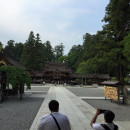
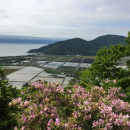
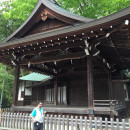
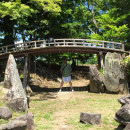
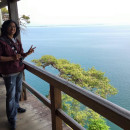
Personal Information
| How much international exposure did you have prior to this program? | 1 month - 6 months |
Review Your Program
|
* Overall educational experience
Academic rigor, intensity, resources, etc. |
I took the 2015 "Crossroads of Japan" history-focused program led by Northern Illinois University historian Dr. Taylor Atkins. I took the JCMU Summer Intensive Japanese Language & Culture program in 2014, but as a history major with a focus on Japan, I was ecstatic to learn about this short travel-oriented program! I came in with high expectations, and even then Dr. Atkins and JCMU far exceeded them. Dr. Atkins not only taught the rich history of the Shiga Prefecture area, he literally just brought us to the locations he taught about and lectured on the go. In two weeks, he brought us to a Ninja Village, a historic Japanese castle, ancient temples & shrines, a historic island in the middle of Lake Biwa, a traditional Japanese wares studio, the Lake Biwa Museum, and more! Dr. Atkins was extraordinarily knowledgeable about everything we saw and everywhere we went. He loved to pull us aside frequently just to lecture about all of the things he was showing us. In fact, we came across a few monuments and structures that he did not mean to show us, but since he is fluent and Japanese and immediately recognized what they were, he would sometimes stop us just to talk about what it was. I truly felt like a scholar in the field, out and about to research Japan's past! Questions were not only welcome, but encouraged: though he has been in the field for decades, he treated those of us on the program like his academic equals. He fully considered each and every single one of our ideas with his complete attention, and he always provided thoughtful feedback and support. I was one of only a couple of history majors on the program, but the others not only did very well, Dr. Atkins even loved the contributions they made to our daily discussions since the non-history major's perspectives would be different (but equally valuable) to his own. It was both an extraordinarily enlightening and positive experience. Of course, the program was rigorous! On top of all of the travel and on-the-go lectures we did, we also had an hour every night where we got together in the JCMU lobby to debrief and discuss what we saw, heard, and read. It was here where Dr. Atkins merely guided our questions and conversations rather than commanding them. He valued our own thoughts and did not want to sway them in any way, so he acted less as a tyrannical teacher and more as a conversation participant himself. Because of this, I feel like every single person on the program deeply engaged with the content, and we all (instructor included) learned an unbelievable amount over the course of just 2 weeks. |
|
* Host Country Program Administration
On-site administration of your program |
All of the paperwork and administrative tasks were explained to me clearly, and there were multiple staff members available in both the U.S. and directly on their campus in Hikone to help me right away whenever anything came up. I honestly wasn't expecting the high level of support I got from a study abroad program - it put my mind at ease. For this program in particular, Dr. Atkins worked together with the staff as well to make sure that our schedules were clearly stated, transportation plans were made, and more. It made it very easy to focus on the program's content. |
|
* Housing:
How satisfied were you with your living arrangements? |
The housing was the best! JCMU has their own dorms that we stayed in. I had my own private bedroom with a study desk, a closet, and a large amount of storage space. In addition, I only had to share our room's kitchen and bathroom with one other person. The kitchen was fully stocked and came with all of the appliances I needed to cook my own Japanese food (including a rice cooker, a must for Japanese cooking). Rooms were adequately cleaned - there were knicks here and there, but I mean, these are rooms used by dozens of other past students, so I wasn't expecting anything brand new. There were the occasional bugs and spiders every now and then, but you can't exactly escape that no matter where in the world you live. That being said, the dorms at JCMU still far exceeded my expectations! |
| * Food: |
Eating sushi and ramen in Japan has ruined my appetite for the same foods in the U.S. - even budget versions of Japanese food in Japan far surpass the quality of their expensive U.S. counterparts. Plenty of delicious places to eat in the area! Not to mention, since we had our own kitchen, we could just make our own food as well. There was a large grocery store within a 5-10 minute bike ride of JCMU, so I was never short on options. |
|
* Social & Cultural Integration:
How integrated did you feel with the local culture? |
Since we were out and about all the time, were were always connecting with different aspects of the area's culture and society. From meeting up with traditional Japanese weavers to saying "hi" to a group of adorable middle school students, I truly felt like I belonged in the Shiga community. |
|
* Health Care:
How well were health issues addressed during the program? |
I never had any issues abroad, but the support and information was readily available should I have needed to take advantage of it. |
| * Safety: |
Japan is already a safe country, but since JCMU had a large on-site staff ready to act in case of emergency, I always felt very comfortable going out and about. |
| If you could do it all over again would you choose the same program? |
Yes
This was my third time studying abroad in Japan, and I think it was also the most amazing experience I've had as well! From Dr. Atkins' wonderful instruction to all of the new sites we explored and considered, I can't think of a single thing I would change about the course. |
Finances
|
* Money: How easily were you able to live on a student's budget?
(1 = not very easy/$200+ on food & personal expenses/week, 2.5 = $100/week, 5 = very easily/minimal cost) |
Hikone life was comparable budget-wise to my life in Lansing. Some grocery items were more in Japan, some were less, but all-in-all it averaged to about the same. Kitchens, bikes, and other resources were provided, which meant that we could save money by biking around and cooking our own meals. To top it off, included in your program fees are all of the transportation/admission costs of getting into all of the various places your instructor takes you to. This means that when Dr. Atkins took us all to all of the amazing places he took us to (Ninja Village, Chikubu Island, historic castles/temples/shrines, and more), it was all covered by JCMU! For our program, even some of the lunches were covered as well - bonus~ |
| Not including program expenses, about how much money did you spend on food and other expenses each week? | $60ish |
| Do you have any general money-saving tips for future study abroad participants? | Cook your own meals! JCMU provides you with a fully stocked kitchen, so you might as well use it. In fact, double your cooking and cultural skills by having one of your Japanese friends teach you how to cook Japanese food. |
Language
| * Did your program have a foreign language component? | No |
Other Program Information
|
* Where did you live?
Select all that apply |
|
|
* Who did you live with?
Select all that apply |
|
|
* Who did you take classes with?
Select all that apply |
|
| About how many local friends did you make that you will likely keep in touch with? |
A Look Back
| * What did you like most about the program? |
|
| * What could be improved? |
|
| * What do you know now that you wish you knew before going on this program? | Dr. Atkins and JCMU were very clear about what the program entailed, so I knew exactly what I was getting into. Even for those of us that knew nothing about Japan/Japanese, they still had a fantastic time on the program. So no suggestions for the JCMU administration and the instructor! Although, Shiga Prefecture and the City of Hikone is an amazing location, and I wish they promoted that more! JCMU's campus is located right on Lake Biwa, the largest freshwater lake in Japan. This meant that one of my favorite places to study was right behind JCMU in the late afternoon as the sun was going down. There're a lot of mountains, shrines, temples, and more in the area too, with the historical sites of Hikone Castle (JCMU students get in free!) and Omihachiman only a short bike ride away. However, the city itself also isn't huge - more of a mid-range city, at around 100,000 people. So there was a lot to do, but also a lot of open space - which, since I get claustrophobic in Tokyo, was perfect for me. |
Reasons For Studying Abroad
| To help future students find programs attended by like-minded individuals, please choose the profile that most closely represents you. |
The Academic or LinguistYou went abroad with specific academic goals in mind; the program credentials and rigor of your coursework abroad were very important to you. You had a great time abroad, but never lost sight of your studies and (if applicable) were diligent with your foreign language study. Good for you! |
Individual Course Reviews
| Course Name/Rating: |
The Crossroads of Japan |
| Course Department: | History |
| Instructor: | Dr. E Taylor Atkins |
| Instruction Language: | English |
| Comments: | It was challenging, but in the best way possible. I could not believe not only how much I learned with Dr. Atkins, but also how much fun I had doing it. Actually going around to all of the historical sites rather than just hearing about them from a textbook really engaged me, and Dr. Atkins' hands-off teaching style made me feel like both a learner and an equal contributor to the Shiga historical discourse. |
| Credit Transfer Issues: | The 3 credits I earned on the program counted directly as upper-level history credit at MSU, so I never had to even worry about transferring anything after returning back to my regular U.S. campus life. |








